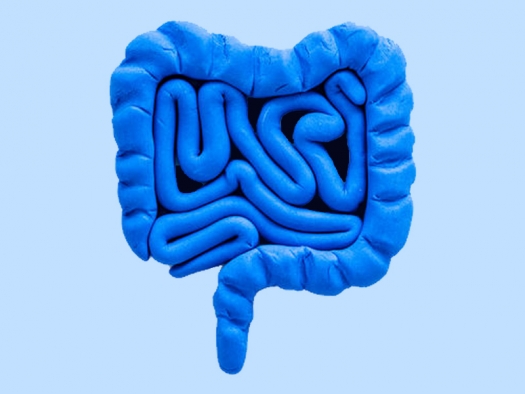IntestinesHealthBlue.jpg

Illustration by Oksana Mironova / 123rf.com
When you think of staying healthy and supporting your immune system, what’s the first thing that comes to mind? Maybe it’s washing your hands and avoiding germs. Or maybe it’s taking copious amounts of vitamin C. These approaches can certainly help ward off any illnesses, but the real secret to a stronger and healthier immune system actually lies in an unexpected place – your gut.
In this article, we’re going to dive into the fascinating connection between your gut and your immune system. And more importantly, we’ll uncover exactly how you can support your gut and give your immune system a boost.
How exactly does gut health affect your immune system?
Your immune system is a complex network of cells, tissues, organs, and signaling molecules that all work together to defend against perceived threats. Increasing research is finding that your gut and immune system are more intricately connected than we had previously thought. Some of the ways your gut supports your immune system include:1,2
- Housing immune cells: Your digestive tract houses a large number of immune cells in what’s known as gut-associated lymphoid tissue. In fact, 70-80 percent of your immune system is found in these special gut tissues.
- Forming a barrier: The epithelial cells that line your intestines are linked together. This forms a barrier that blocks harmful pathogens from entering the rest of your body and causing damage.
- Trapping bacteria: The cells that line your digestive tract are coated with mucins and glycoproteins that trap harmful bacteria so they can be neutralized and excreted.
- Sounding the alarm: Your intestinal cells act as sensors – sounding the alarm and recruiting immune cells to destroy foreign invaders.
- Communicating with your immune system: Your immune system and the millions of beneficial bacteria that reside in your gut are able to “cross-talk.” This means they can communicate crucial information to keep you healthy.
- Producing metabolic compounds: The beneficial bacteria that reside in your gut produces short-chain fatty acids and a number of other compounds that boost immunity, reduce inflammation, and play important roles in other metabolic functions.
- Crowding out “bad” bacteria: A healthy population of beneficial bacteria doesn’t leave room for potentially harmful bacteria to make themselves at home and start replicating.
So you see, your gut provides protection both structurally and with its ecosystem of microorganisms. Now, let’s take a look at exactly how your immune system can be impacted if this ecosystem of microbes in your gut becomes disrupted.
How dysbiosis impacts your immune system
Your microbiome is composed of a cocktail of diverse organisms – with thousands of different microbes making themselves at home and performing different functions. Your microbiome is designed to maintain homeostasis.
When in homeostasis, a healthy balance of beneficial microorganisms do their jobs while any bad bacteria get flagged and removed before they even have a chance to replicate. But when this delicate ecosystem becomes imbalanced, it can throw your immune system out of whack.
An imbalanced microbiome is known as gastrointestinal dysbiosis and occurs when invading microorganisms begin populating your gut and crowding out the “good” bacteria.3 This interferes with your gut’s ability to properly communicate and coordinate with your immune system. Or worse, dysbiosis can cause your immune system to become overworked and hypervigilant – leading your body to mistakenly begin attacking your own cells and setting the stage for autoimmunity.
While the microbes that make up your microbiome are important, there’s another piece of the puzzle that’s crucial to supporting a healthy microbiome and keeping your immune system running on all cylinders – the integrity of your gut.
What is leaky gut syndrome?
Your intestinal lining covers more than 4,000 square feet of surface area and is constantly bombarded with toxins and foreign pathogens through the food you ingest.4 Because of the large surface area and constant exposure to potentially harmful microbes, our digestive tract is designed to be the ultimate barrier. It keeps potentially harmful compounds locked up tight until they can be excreted.
It accomplishes this with a thin layer of cells lining the inside of your intestines that are linked together by proteins called tight junctions.5 These tight junctions serve as the gateway for nutrients to pass from your intestines into your bloodstream. They’re like a filter, allowing approved substances to pass into the bloodstream and others to remain in the intestines to be processed out.
But if these tight junctions become compromised, the “gaps” that allow nutrients to pass through get larger and larger – allowing tiny particles never meant to enter your bloodstream to begin squeezing their way through. This compromise in the integrity of your intestinal lining is known as “increased intestinal permeability,” or “leaky gut syndrome” and it can have serious implications for your immune system.
Leaky gut, dysbiosis, and your immune system
Leaky gut syndrome can send your immune system into a tailspin. Here’s how:
- Step 1: As substances leak out, they cause low-level inflammation, sending your immune system into overdrive in an attempt to address the perceived threats.
- Step 2: Due to the damage to your intestinal lining, your gut is unable to properly digest food, causing a shift in the balance of your microbiome and resulting in dysbiosis.
- Step 3: This dysbiosis further triggers your immune system, causing your body to ramp up its immune response even more.
- Step 4: This causes a vicious cycle of more inflammation, increased dysbiosis, and subsequently, even more damage to the lining of your gut.
This downward spiral of dysbiosis and inflammation burns out your immune system – leaving it with less and less energy to fight off foreign invaders. Fortunately, there are some simple steps you can take to heal your gut and ensure your immune system is firing on all cylinders.
How to heal your gut and boost your immune system
Having an optimally functioning gut, and subsequently, a healthy immune system requires two things: integrity of the lining of your intestinal tract and a flourishing population of beneficial bacteria. Let’s take a look at some of the best ways to heal your gut and give your immune system a boost.
Focus on a healthy diet
The food you eat is one of the most powerful tools you have when it comes to healing your gut and boosting your immune system. By focusing on nutrient-dense, non-inflammatory foods that support a healthy microbiome, you give your gut the tools it needs to begin healing. Some simple ways to incorporate non-inflammatory and gut-friendly foods include:
- Basing your diet on real food: Focus on building your meals around fresh vegetables and fruits, high-quality protein, and healthy fats.
- Minimizing inflammatory foods: Refined oils and sugars, artificial sweeteners, and processed food can irritate and inflame your gut, so keeping these foods to a minimum will reduce your overall inflammation.
- Incorporate gut-friendly foods: Probiotic-rich and fermented foods like kombucha, sauerkraut, and yogurt help replenish your gut with beneficial bacteria.
While the food you eat is an excellent foundation, the truth is most of us simply can’t get all the gut-healing nutrients we need from diet alone – which is why I highly recommend adding in some specific supplements.
Take gut healing supplements
Supplements are one of my favorite ways to give your body a concentrated dose of nutrients. The most potent gut-healing supplements that give you the most bang for your buck are:
- Probiotics: Maintaining a balanced ecosystem among the bacteria that reside in your gut is pivotal when it comes to the overall health of your gut and immune system. Taking a daily probiotic ensures that you have plenty of beneficial bacteria that will crowd out any bad bacteria.
- Collagen: Chock-full of healing amino acids, collagen works to essentially “seal the gaps” in the lining of your intestines.
- Glutamine: As a type of amino acid, glutamine can help reduce inflammation and plays a particularly important role in replenishing the tissues that make up the lining of your gut.
- Digestive Enzymes: If you’re suffering from an imbalanced microbiome and leaky gut syndrome, you can bet your bottom dollar that you’re not digesting nutrients properly. Digestive enzymes can help your body break down the food you ingest and ensure it’s more readily used by your body.
These supplements will help get your gut healthy, which will give your immune system a boost.
Reduce your toxic burden
All of us are inevitably exposed to countless toxins on a daily basis. The problem arises when your body becomes overloaded and can’t properly filter out these toxins, allowing them to begin to accumulate in your body. This toxic overload is double trouble and can result in:
- An overworked and burnt-out immune system – depleting your immune system of the energy and resources it needs to fight off potential threats
- A negative impact on the health of your gut by promoting dysbiosis and damaging the integrity of the lining of your gut
Putting it all together
While we still have more to learn about the relationship between our guts and our immune systems, research has proven that your gut does a whole lot more than just digest your dinner. The health of your gut plays an instrumental role in beefing up your defenses and keeping your immune system in tip-top shape.
So if you’re looking for ways to give your immune system a boost, give your gut some love and follow the tips outlined in this article.
References
Vighi G, Marcucci F, Sensi L, Di Cara G, Frati F. Allergy and the gastrointestinal system. Clin Exp Immunol. 2008;153 Suppl 1(Suppl 1):3-6. doi:10.1111/j.1365-2249.2008.03713.x
Platt, Andrew M. Immunity in the Gut. British Society for Immunology.
Wu HJ, Wu E. The role of gut microbiota in immune homeostasis and autoimmunity. Gut Microbes. 2012;3(1):4-14. doi:10.4161/gmic.19320
Campos, Marcelo. Leaky gut: What is it, and what does it mean for you? Harvard Health Publishing.
Dulantha Ulluwishewa, Rachel C. Anderson, Warren C. McNabb, Paul J. Moughan, Jerry M. Wells, Nicole C. Roy, Regulation of Tight Junction Permeability by Intestinal Bacteria and Dietary Components, The Journal of Nutrition, Volume 141, Issue 5, May 2011, Pages 769–776, https://doi.org/10.3945/jn.110.135657
* These statements have not been evaluated by the Food and Drug Administration. The product mentioned in this article are not intended to diagnose, treat, cure, or prevent any disease. The information in this article is not intended to replace any recommendations or relationship with your physician. Please review references sited at end of article for scientific support of any claims made.
How to Heal Your Gut for a Stronger Immune System was originally published on Dr. Jill's website on June 24, 2020; used with permission.


